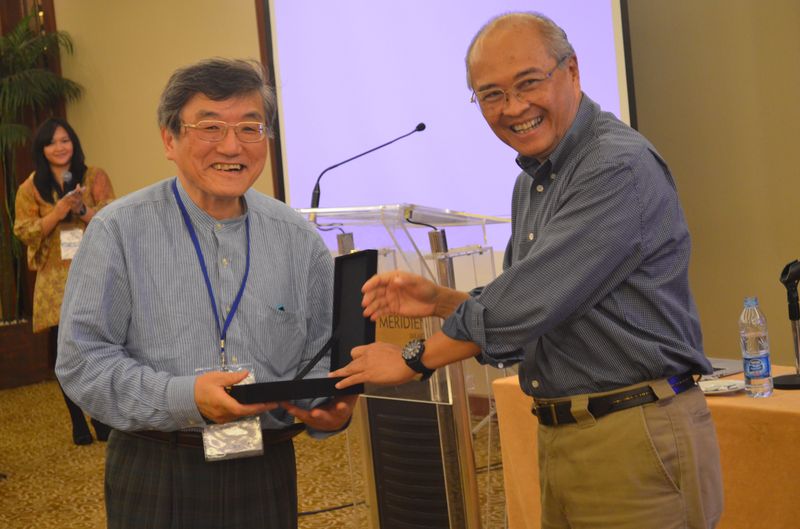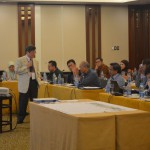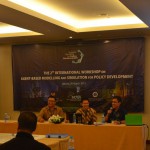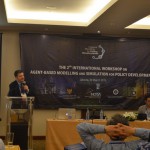 The 2nd International Workshop on Agent-Based Simulation for Policy Development was held in Jakarta (30/3/2013). The event was a collaboration result between the President’s Delivery Unit for Development Monitoring and Oversight (UKP4), Indonesia National Committee for Applied Systems Analysis (INCASA) and School of Business and Management ITB (SBM ITB). The objective of this event was to introduce recent application and to encourage the application of Agent-based simulation for policy development, to the policy makers from various agencies and academics in Indonesia.
The 2nd International Workshop on Agent-Based Simulation for Policy Development was held in Jakarta (30/3/2013). The event was a collaboration result between the President’s Delivery Unit for Development Monitoring and Oversight (UKP4), Indonesia National Committee for Applied Systems Analysis (INCASA) and School of Business and Management ITB (SBM ITB). The objective of this event was to introduce recent application and to encourage the application of Agent-based simulation for policy development, to the policy makers from various agencies and academics in Indonesia.
Opened by Prof. Dr. Kuntoro Mangkusubroto as the Head of UKP4 who is also the Head of INCASA, this SBM ITB’s Professor put his emphasis to the importance of agent-based simulation approach contribution for policy development in Indonesia. On this occasion, INCASA as an organization aiming to encourage the application of systems analysis (including agent-based simulation) for national policy development was also introduced.
 The 2nd International Workshop on Agent-based Simulation for Policy Development digelar di Jakarta (30/3/2013). Hasil kolaborasi antara Unit Kerja Presiden Bidang Pengawasan dan Pengendalian Pembangunan (UKP4), Indonesia National Committee for Applied Systems Analysis (INCASA), dan Sekolah Bisnis dan Manajemen ITB (SBM ITB) bertujuan memperkenalkan aplikasi terbaru serta mendorong pemanfaatan agent-based simulation untuk para pembuat kebijakan dan akademisi di Indonesia.
The 2nd International Workshop on Agent-based Simulation for Policy Development digelar di Jakarta (30/3/2013). Hasil kolaborasi antara Unit Kerja Presiden Bidang Pengawasan dan Pengendalian Pembangunan (UKP4), Indonesia National Committee for Applied Systems Analysis (INCASA), dan Sekolah Bisnis dan Manajemen ITB (SBM ITB) bertujuan memperkenalkan aplikasi terbaru serta mendorong pemanfaatan agent-based simulation untuk para pembuat kebijakan dan akademisi di Indonesia.
 This workshop started with a presentation by Prof. Kyoichi Kijima from the Tokyo Institute of Technology on Agent-Based Simulation for Car-Sharing Mechanism.The Car-Sharing Mechanism was a short-term car rental business model considered as being able to reduce the number of cars on road and the level of pollution. The workshop was continued with table top exercise guided by Prof. Hiroshi Deguchi from Tokyo Institute of Technology. The table top exercise was intended to demonstrate the benefit of agent-based simulation in surfacing decision maker’s perception regarding the phenomena occured in the real world.The discussion in this session was guided by INCASA’s Secretary and Professor of Decision Making from SBM ITB, Prof. Utomo Sarjono Putro.
This workshop started with a presentation by Prof. Kyoichi Kijima from the Tokyo Institute of Technology on Agent-Based Simulation for Car-Sharing Mechanism.The Car-Sharing Mechanism was a short-term car rental business model considered as being able to reduce the number of cars on road and the level of pollution. The workshop was continued with table top exercise guided by Prof. Hiroshi Deguchi from Tokyo Institute of Technology. The table top exercise was intended to demonstrate the benefit of agent-based simulation in surfacing decision maker’s perception regarding the phenomena occured in the real world.The discussion in this session was guided by INCASA’s Secretary and Professor of Decision Making from SBM ITB, Prof. Utomo Sarjono Putro.
 In the second session chaired by Ping Yowargana from UKP4 discussed the application of agent-based simulation on areal case in Indonesia. The first case presented by Dr. Akhmad Hidayatno from the University of Indonesia discussed the application of Agent-Based Simulation in designing Mass Rapid Transport (MRT) system in Jakarta. From this presentation, the participants did not only earn an explanation regarding the potential applications of agent-based simulation for the MRT design, but they also gained an insight on how agent-based simulation could be used to manage the people movement in general. Moving on to the second case discussing beef self-sufficiency in Indonesia was presented by Dr. Ivan Fanany from the University of Indonesia. This presentation provided an insight to the participants on how the commodity prices in general might emerge as a result of agent’s interaction.
In the second session chaired by Ping Yowargana from UKP4 discussed the application of agent-based simulation on areal case in Indonesia. The first case presented by Dr. Akhmad Hidayatno from the University of Indonesia discussed the application of Agent-Based Simulation in designing Mass Rapid Transport (MRT) system in Jakarta. From this presentation, the participants did not only earn an explanation regarding the potential applications of agent-based simulation for the MRT design, but they also gained an insight on how agent-based simulation could be used to manage the people movement in general. Moving on to the second case discussing beef self-sufficiency in Indonesia was presented by Dr. Ivan Fanany from the University of Indonesia. This presentation provided an insight to the participants on how the commodity prices in general might emerge as a result of agent’s interaction.
 The final session of the workshop was then filled by the presentation of Dr. Vlasios Voudouris from London Metropolitan Business School. Dr. Voudouris described the importance and the benefits of considering complex interaction mechanisms in in policy-making. A case example chosen by Dr. Voudouris was the application of agent-based simulation for energy policy development. According to him, agent-based simulation could assist policy development to efficiently obtain useful energy and promote economic growth. This final session was chaired by Dr. Yos Sunitiyoso from SBM ITB. *** (DSU)
The final session of the workshop was then filled by the presentation of Dr. Vlasios Voudouris from London Metropolitan Business School. Dr. Voudouris described the importance and the benefits of considering complex interaction mechanisms in in policy-making. A case example chosen by Dr. Voudouris was the application of agent-based simulation for energy policy development. According to him, agent-based simulation could assist policy development to efficiently obtain useful energy and promote economic growth. This final session was chaired by Dr. Yos Sunitiyoso from SBM ITB. *** (DSU)
Workshop ini dibuka oleh Prof. Dr. Kuntoro Mangkusubroto selaku kepala Unit Kerja Presiden Bidang Pengawasan dan Pengendalian Pembangunan (UKP4), ketua INCASA, dan Profesor dari SBM ITB. Dalam sambutannya, Prof. Kuntoro menekankan pentingnya kontribusi agent-based simulation terhadap pembuatan kebijakan di Indonesia. Pada kesempatan ini, diperkenalkan pula INCASA sebagai organisasi yang bertujuan untuk mendorong penerapan analisa sistem (termasuk agent-based simulation) dalam pembuatan kebijakan nasional.
 Dimulai dengan presentasi dari Prof. Kyoichi Kijima dari Tokyo Institute of Technology mengenai Agent-based simulation dalam mekanisme Car-Sharing, Prof. Kijima menjelaskan bahwa mekanisme Car-Sharing merupakan model bisnis penyewaan mobil yang dianggap dapat mengurangi jumlah mobil yang ada di jalan raya sekaligus menurunkan tingkat polusi. Workshop ini kemudian dilanjutkan dengan table top exercise yang dipandu oleh Prof. Hiroshi Deguchi dari Tokyo Institute of Technology. Table top exercise ini bertujuan untuk mendemonstrasikan manfaat agent-based simulation dalam mengungkap persepsi para pembuat keputusan mengenai suatu fenomena yang terjadi pada dunia nyata. Diskusi yang dilaksanakan pada sesi pertama ini dipandu oleh sekretaris INCASA yang juga merupakan profesor dalam bidang pembuatan keputusan di SBM ITB, yaitu Prof. Utomo Sarjono Putro.
Dimulai dengan presentasi dari Prof. Kyoichi Kijima dari Tokyo Institute of Technology mengenai Agent-based simulation dalam mekanisme Car-Sharing, Prof. Kijima menjelaskan bahwa mekanisme Car-Sharing merupakan model bisnis penyewaan mobil yang dianggap dapat mengurangi jumlah mobil yang ada di jalan raya sekaligus menurunkan tingkat polusi. Workshop ini kemudian dilanjutkan dengan table top exercise yang dipandu oleh Prof. Hiroshi Deguchi dari Tokyo Institute of Technology. Table top exercise ini bertujuan untuk mendemonstrasikan manfaat agent-based simulation dalam mengungkap persepsi para pembuat keputusan mengenai suatu fenomena yang terjadi pada dunia nyata. Diskusi yang dilaksanakan pada sesi pertama ini dipandu oleh sekretaris INCASA yang juga merupakan profesor dalam bidang pembuatan keputusan di SBM ITB, yaitu Prof. Utomo Sarjono Putro.
 Pada sesi kedua yang dipimpin oleh Ping Yowargana dari UKP4, diskusi bergeser pada aplikasi agent-based simulation pada kasus nyata di Indonesia. Kasus pertama yang dipresentasikan oleh Dr. Akhmad Hidayatno dari Universitas Indonesia membahas tentang pemanfaatan Agent-based simulation pada proses desain sistem Mass Rapid Transport (MRT) di Jakarta. Dalam pemaparan ini, peserta tidak hanya memperoleh penjelasan mengenai bagaimana penerapan agent-based simulation pada desain MRT, tetapi juga memahami bagaimana mengaplikasikan agent-based simulation untuk mengatur perpindahan manusia secara umum. Workshop kemudian dilajutkan dengan pemaparan kasus swasembada daging sapi yang dipresentasikan oleh Dr. Ivan Fanany dari Universitas Indonesia. Kasus ini memberikan pemahaman tentang bagaimana harga suatu komoditas secara umum dapat terbentuk sebagai akibat dari interaksi antar agen.
Pada sesi kedua yang dipimpin oleh Ping Yowargana dari UKP4, diskusi bergeser pada aplikasi agent-based simulation pada kasus nyata di Indonesia. Kasus pertama yang dipresentasikan oleh Dr. Akhmad Hidayatno dari Universitas Indonesia membahas tentang pemanfaatan Agent-based simulation pada proses desain sistem Mass Rapid Transport (MRT) di Jakarta. Dalam pemaparan ini, peserta tidak hanya memperoleh penjelasan mengenai bagaimana penerapan agent-based simulation pada desain MRT, tetapi juga memahami bagaimana mengaplikasikan agent-based simulation untuk mengatur perpindahan manusia secara umum. Workshop kemudian dilajutkan dengan pemaparan kasus swasembada daging sapi yang dipresentasikan oleh Dr. Ivan Fanany dari Universitas Indonesia. Kasus ini memberikan pemahaman tentang bagaimana harga suatu komoditas secara umum dapat terbentuk sebagai akibat dari interaksi antar agen.
 Lebih lanjut, presentasi Dr. Vlasios Voudouris dari London Metropolitan Business School mengisi sesi akhir workshop dengan dipandu Dr. Yos Sunitiyoso dari SBM ITB. Dr. Voudouris memberikan penjelasan mengenai urgensi dan manfaat dalam mempertimbangkan mekanisme dalam pembuatan kebijakan. Kasus yang diangkat oleh Dr. Voudouris adalah pemanfaatan agent-based simulation untuk pembuatan kebijakan pada bidang energi. Menurutnya, agent-based simulation dapat membantu pembuatan kebijakan untuk memperoleh useful energy secara efisien, dan pada akhirnya akan mendorong pertumbuhan ekonomi.
Lebih lanjut, presentasi Dr. Vlasios Voudouris dari London Metropolitan Business School mengisi sesi akhir workshop dengan dipandu Dr. Yos Sunitiyoso dari SBM ITB. Dr. Voudouris memberikan penjelasan mengenai urgensi dan manfaat dalam mempertimbangkan mekanisme dalam pembuatan kebijakan. Kasus yang diangkat oleh Dr. Voudouris adalah pemanfaatan agent-based simulation untuk pembuatan kebijakan pada bidang energi. Menurutnya, agent-based simulation dapat membantu pembuatan kebijakan untuk memperoleh useful energy secara efisien, dan pada akhirnya akan mendorong pertumbuhan ekonomi.



